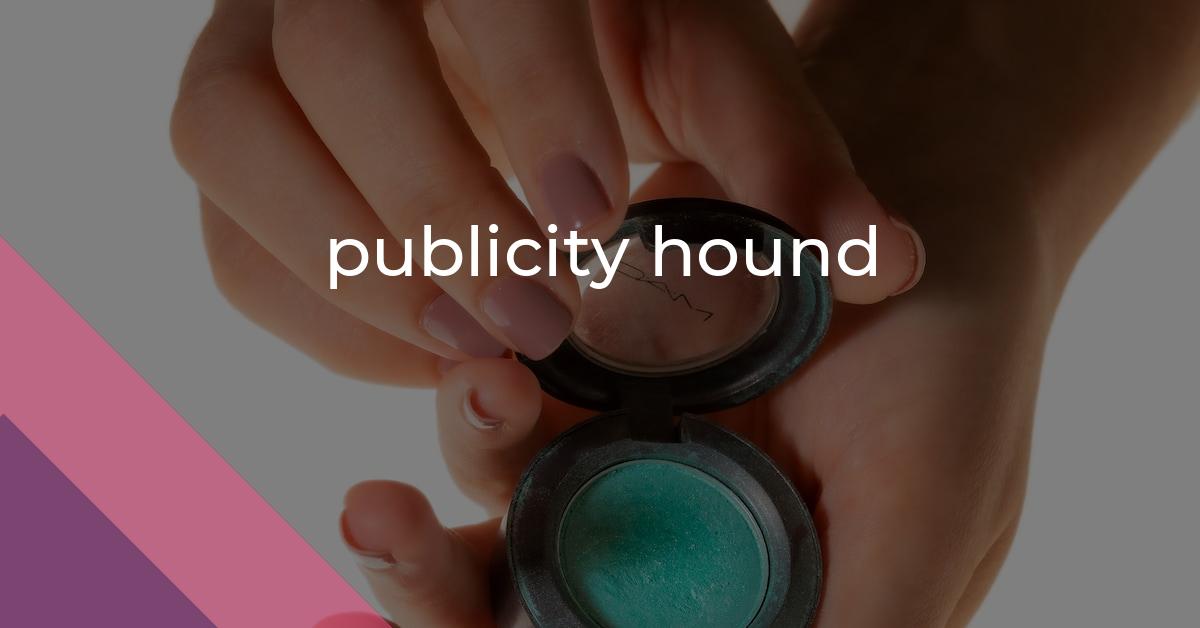publicity hound: Idiom Meaning and Origin
What does ‘publicity hound’ mean?
The idiom "publicity hound" refers to a person who relentlessly seeks attention and publicity. They are often willing to do anything to be in the spotlight, even if it means behaving in an exaggerated or attention-seeking manner.

Idiom Explorer
An idiom that refers to the spreading of false information or gossip about someone or something, often with the intention of damaging their reputation.
An idiom often used to describe a person who is disliked or considered bad, with negative qualities or behavior.
The idiom "put on the dog" means to dress or act in an extremely fancy or extravagant manner, often to show off or impress others.
The idiom "power-hungry" refers to a person who is excessively eager or desperate to gain or maintain power. They are driven by a strong desire for control or authority and may use unethical or manipulative means to achieve their goals.
The idiom *poster girl* refers to a person who embodies the qualities or characteristics of a particular cause, movement, or idea, often used in a positive or idealized way.
The idiom "poster boy" refers to a person who embodies or represents a particular quality, cause, or characteristic. They are often used as a symbol or spokesperson to promote or advertise something.
The idiom "play up" means to emphasize or highlight something, often in order to gain attention or elicit a certain reaction. It can also refer to exaggerating or overplaying a situation or a person's abilities.
The idiom "party animal" refers to someone who enjoys attending and participating enthusiastically in parties or social events. This person is known for their lively and energetic behavior and is often the life of the party.
The Attention Seeker
A publicity hound is an idiom that describes a person who craves or seeks out public attention or fame. The term "hound" refers to someone who relentlessly pursues this attention, much like a hunting dog. When someone is referred to as a publicity hound, it means they actively seek opportunities to be in the public eye. This can include engaging in attention-seeking behaviors, exaggerating achievements, constantly promoting oneself, or deliberately seeking media attention.
The origins of the "publicity hound" idiom are unclear, but it likely emerged in the 20th century, possibly in American English. The term aligns with the broader development and usage of idiomatic expressions during that time period. Today, it carries a negative connotation, often implying that the person is self-centered or narcissistic.
Publicity hounds can be found in various fields, including entertainment and politics. These individuals go to great lengths to maintain a high public profile, using tactics like staging public stunts, engaging in controversial behavior, or making provocative statements. They are like attention whores, constantly seeking the spotlight and media validation.
An example of a publicity hound is Andy Warhol, an influential American artist and filmmaker. Warhol actively sought media attention and cultivated a provocative image. He embraced the concept that "everyone will be famous for fifteen minutes," strategically using publicity to solidify his status as a cultural icon. Warhol exemplifies the idea of being a publicity hound, as he engaged in attention-seeking behaviors to gain recognition and fame.
The idiom "publicity hound" reflects society's fascination with fame and recognition. In today's media-dominated culture, the pursuit of attention and public validation has become a significant aspect of modern life. We are like dogs in the hunt, seeking media attention to make ourselves known and validated.
The idea of the "media darling" is closely related to the concept of the publicity hound. A media darling is someone who is adored and favored by the media. These individuals often receive constant media attention and are frequently in the spotlight. They are like magnets, attracting the media's attention and becoming a topic of discussion.
The idiom "in the spotlight" perfectly captures the essence of a publicity hound. When someone is in the spotlight, they are the center of attention, receiving extensive media coverage and public scrutiny. Publicity hounds actively seek to be in the spotlight, using various tactics and strategies to capture the media's attention and maintain their public presence.
The idiom "make news" is also closely related to the concept of the publicity hound. When someone makes news, they generate attention-grabbing headlines and become the focus of media coverage. Publicity hounds are skilled at making news, employing attention-seeking behaviors and tactics to ensure that they are constantly making headlines and staying relevant in the public eye.
The idiom "publicity hound" describes a person who actively seeks public attention and recognition. This term originated in the 20th century and is often used to characterize individuals who engage in attention-seeking behaviors or deliberately seek media exposure. The concept of the publicity hound reflects society's fascination with fame and serves as a reminder of the complex dynamics between individuals, the media, and society at large. Whether we see them as attention whores, dogs in the hunt, media darlings, or individuals always in the spotlight, publicity hounds play a significant role in our media-driven world.
Example usage
Examples of how the idiom *publicity hound* can be used in a sentence:
- She is a publicity hound, always seeking attention and media coverage.
- The celebrity's manager was accused of being a publicity hound, constantly trying to generate buzz for his client.
- The politician's behavior at the press conference showed that he was a publicity hound, more interested in making headlines than addressing the issues at hand.
More "Marketing" idioms



